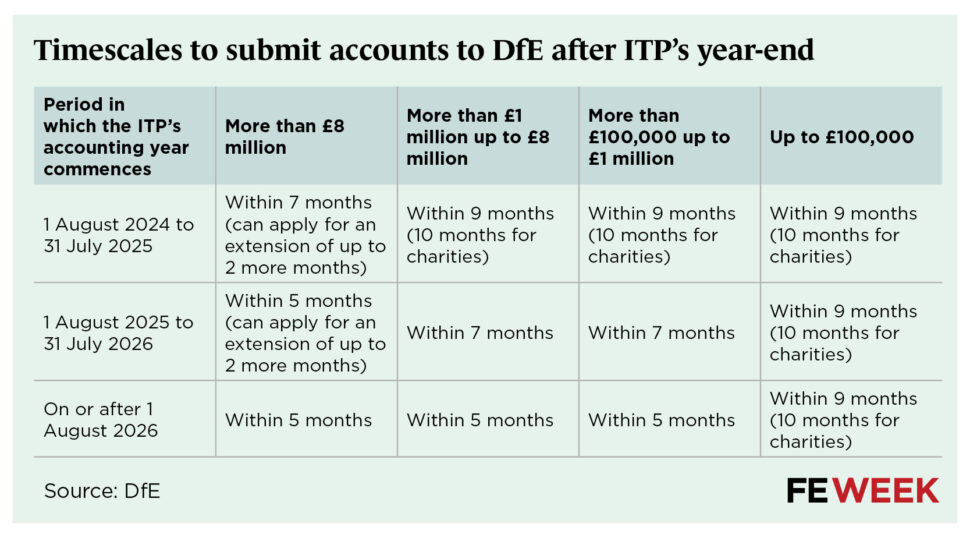Independent training providers that fail to submit their accounts to the Department for Education on time will be automatically hit with an ‘inadequate’ financial health rating, according to new rules.
The move, revealed yesterday, comes as the deadline for submitting financial statements is due to be shortened from nine months after the academic year end to five months (see table below).
The DfE said it is keen to obtain “earlier clarity” over ITPs’ financial risk levels, but the tighter deadline and harsher consequence of late accounts submissions have prompted fears that providers risk being punished, even if there are “extenuating circumstances”.
According to government guidance on how ITPs, special post-16 institutions and non-maintained special schools are assessed as financially healthy, failure to submit financial statements on a timely basis, or when requested, “will result” in an ‘inadequate’ financial health grade until statements are submitted and assessed.
The rules previously said late filing of accounts “may” result in the lowest possible health rating.
Consequences of a business or organisation being rated ‘inadequate’ – which the DfE defines as at a “significant risk” of failing to fulfil its contractual obligations – are severe and include the threat of contract termination.
Ben Rowland, CEO of the Association of Employment and Learning Providers, said: “While robust financial oversight is vital when taxpayers’ money is at play, I do worry this is a change that risks punishing providers who have extenuating circumstances rather than genuine financial weakness.
“Independent training providers play a critical role in delivering apprenticeships and skills programmes, often operating on tight timescales and margins.
“We’d urge DfE to take a proportionate approach that distinguishes between late paperwork and real financial concern.”
The DfE declined to comment further.
The latest rule change on accounts follows the DfE’s joint goals of identifying financial risks as soon as possible while offering “certainty” to providers about what good management looks like.
Rules outlined in the financial handbook, unveiled last year, argue that shorter deadlines for submitting full accounts would bring ITPs in line with the five-month deadline that colleges and higher education providers already face.

For colleges, a consequence of late submission of 30 days or more, or beyond an agreed deadline, can be formal intervention.
A festive inconvenience
Mark Dawe, chief executive of The Skills Network, said the threat of being rated inadequate combined with shorter deadlines will be “an issue for everyone”.
He added: “In the preparation for this last year we squeezed our timing together and we managed to do it within six months.
“But the deadline is the 31st of December – getting the board together at the Christmas period is a real challenge. We did it and it was hard work and if anyone had problems it would have been a real challenge.
“You can see why the DfE wants audited accounts earlier, but there are just practicalities about achieving that.”
Luke Muscat, CEO of the Back 2 Work Group, said: “In principle I don’t have a problem with this. Organisations accessing public funding should be able to demonstrate that they are financially robust.
“You would, however, hope that there is a degree of common sense applied to this and that the provider was engaged prior to any action being taken.
“For example, it would not be appropriate for an automatic ‘inadequate’ rating to be issued in scenarios where it was administrative error, or simply an oversight in filing accounts with the department.”
















Your thoughts